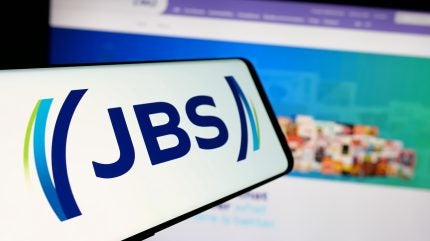
Shares in JBS, the Brazilian meat giant, closed up slightly on their first day in trading in New York on Friday (13 June) as NGOs warned of a “legal backlash” against the controversial listing.
JBS made its debut on the New York Stock Exchange (NYSE) on Friday amid criticism of the group’s environmental record and governance structure.

Discover B2B Marketing That Performs
Combine business intelligence and editorial excellence to reach engaged professionals across 36 leading media platforms.
The listing has drawn scrutiny from shareholder advisors, NGOs and legal experts, who have highlighted the company’s ties to deforestation and the possible regulatory challenges facing the Seara brand owner.
Shareholder advisory firms ISS and Glass Lewis recommended voting against the listing, pointing to “a governance structure that disempowers minority shareholders and raises long-term ESG risks”, according to a statement issued on Friday.
NGO Global Witness, meanwhile, claimed JBS faces nearly $7bn in legal liabilities. In 2024, the meat major generated an “adjusted EBITDA” of $7.2bn.
JBS has contested the figure on its legal liabilities, telling Just Food it had stated in documents related to the share listing in New York that “possible” liabilities were $6bn.

US Tariffs are shifting - will you react or anticipate?
Don’t let policy changes catch you off guard. Stay proactive with real-time data and expert analysis.
By GlobalData“It is important to note that proceedings classified as ‘possible’ under IFRS are not necessarily expected to materialize. These do not reflect expected or likely losses, but rather proceedings for which an unfavourable outcome cannot be ruled out,” JBS said in a statement.
Ashley Thomson, senior US adviser of Global Witness, called the meat giant’s public debut in the US a “dark milestone”, adding the SEC’s decision is “one with material planetary consequences”.
The company’s environmental record has come under fire. Earlier this month, the New Climate Institute described JBS’s “overall climate strategy integrity” as “very poor”.
In 2021, JBS stated an “ambition to strive for net zero greenhouse gas emissions in our operations and across our shared value chain by 2040”.
“JBS’s commitment to reach net-zero emissions by 2040 is not accompanied by an emission reduction target,” a report by the NGO read. “JBS plans to continue growth in a greenhouse gas emission-intensive industry; we did not find evidence that JBS is embarking on key transitions in the sector that would enable deep emission reductions.”
Alex Wijeratna, a senior Director at NGO Mighty Earth, said: “It’s fitting that JBS is listed on the New York Stock Exchange on Friday 13th but this is more than bad luck: it’s a catastrophe for the planet. Giving JBS access to billions of dollars of new funding will serve to supercharge its climate-wrecking operations and war on nature. We and many others have shown that JBS continues to profit from allowing cattle grazed on illegally deforested land in the Amazon and other protected areas, to enter its beef supply chains in Brazil.”
Mighty Earth said it has informed the NYSE that JBS’s listing may violate US anti-money laundering laws by enabling profits tied to illegal deforestation in Brazil’s beef supply chains.
In an SEC filing in April, JBS admitted: “There can be no assurance that available monitoring procedures can ensure that the origin of any head of cattle was in full compliance with applicable laws, regulations or our responsible procurement policy.”
As part of the new US listing, JBS has a new Netherlands-based holding structure. Greenpeace argues the structure exposes JBS to legal challenge in the Netherlands.
“JBS’ choice of the Netherlands as its new home may well see it join other big polluters whose growth plans are being challenged in the Dutch courts,” Daniela Montalto, senior campaigner at Greenpeace UK, said. “Investors should be aware of the risk not only of being exposed to potentially costly and lengthy litigation but more critically a risk to the very viability of JBS’ growth-based business model, which forms the basis of their investment decision.”
JBS’s shares trading in New York closed on Friday at $13.87 after opening the day at $13.65.
In a statement issued on Friday, JBS CEO Gilberto Tomazoni said: “This step strengthens our access to global capital markets and enhances our ability to deliver long-term value to shareholders, team members, and the communities we serve.”





